
Recovering Warrior task force meets
The Department of Defense’s 14-member Recovering Warrior Task Force (RWTF) held its first meeting recently in Washington, D.C., launching a four-year study commissioned by Congress. The task force will evaluate the effectiveness of DoD policies and programs for recovering wounded and ill warriors, and also assess best practices for their continuing treatment and readjustment after military service.
American Legion Past National Commander David K. Rehbein is a member of the task force and said the group’s work “is designed to cover the complete transition from a wounded warrior’s first treatment in a military hospital to a productive military or civilian career. Since all our recovering warriors will one day make the transition to civilian life, the attention we give to rehabilitation, education, employment and veterans benefits will help to ease that transition.”
The RWTF, made up of seven military and seven non-military members, is required to provide Congress with annual reports on a variety of topics, including case management, systems of performance and accountability, vocational training, the staffing of Wounded Warrior units, services for traumatic brain injury and post-traumatic stress, family support and the Disability Evaluation System.
Information gathered by the task force will be used to make specific recommendations to Congress on how to further improve DoD services and programs for recovering warriors.
The RWTF is co-chaired by Lt. Gen. Charles B. Green, Surgeon General of the U.S. Air Force, and Dr. Karen Guice, executive director of the Federal Recovery Coordination Program for VA. The task force’s official name is the Department of Defense Task Force on the Care, Management and Transition of Recovering Wounded, Ill and Injured Members of the Armed Forces.
“I’m very pleased that the task force includes members with expertise in the veterans community, and that it is also developing ways to evaluate more thoroughly the treatment and rehabilitation of our recovering National Guard and reserve officers,” Rehbein said.
American Legion National Security Division Director Barry Searle, a retired Army colonel and Afghanistan combat veteran, was in the audience for RWTF’s first meeting. “I was very happy to see that the task force has significant interest in studying the reserve component of these issues, and the quality of services being provided wounded servicemembers in rural areas,” he said.
“It’s obvious to me that this task force is passionate about making real changes for the better – not just talking about it,” said Daryl Hill, a Marine Corps Reservist and Iraq combat veteran who also attended the public meeting. “It was great to hear they’ll be making site visits, and listening to the wounded veterans themselves – asking them about the resources they really need.”
Hill is the Legion’s Heroes to Hometowns coordinator.
